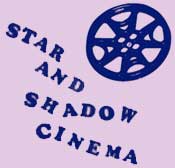Japanese Film Festival 2012: The Ghost Cat and the Mysterious Shamisen
Dir. Kiyohiko Ushihara, 1938
-
Sat 14 January 2012 // 19:30
/ Cinema
EXCLUSIVE SCREENING
This is the very exclusive screening of a film never shown in the UK before 2011. Only recently subtitled in English, it was only shown in London, at the Insttitute of Contemporary Arts, in Nov 2011, before this screening.
One of Japan's few surviving prewar horrors, it involves love, revenge, jealous women murdering cats, and a cat returning as a ghost.
HORROR FILM FROM THE GHOST CAT PERIOD
This is a quintessential example of the period "ghost cat" movie, a substantial supernatural subgenre based in folklore.
This genre stretches back at least as far as Shôzô Makino's The Cat of Okazaki (Okazaki no neko, 1914), this was one of at least six such titles released between 1937-40, many of which were written by Kenji Hata, to feature Japan's first scream queen, Sumiko Suzuki.
THE PLOT
Mitsue is a possessive actress betrothed to apprentice shamisen player Seijirô. When one day Okiyo, a beautiful young girl of samurai class, is led to Seijirô's house by his lost cat Kuro, she becomes besotted with him.
Dark jealous passions are invoked in Mitsue, which are intensified when Seijirô gifts Okiyo his precious shamisen. The cat is the first to suffer at the end of Mitsue's hairpin, but returns from the grave to assist Okiyo’s younger sister Onui avenge her sister's murder.
Director Kiyohiko Ushihara employs an arsenal of dark double exposures, slow motion sequences and specially-developed lenses to convey this dark, uncanny tale.
THE DIRECTOR: Kiyohiko Ushihara (1897-1985)
Barely known in the West and with little of his work surviving, Kiyohiko Ushihara (1897-1985) was one of Japan's leading directors of the silent period, directing some 70 titles for Shochiku from 1921-30, with 9 months spent studying filmmaking in Hollywood under Charlie Chaplin during 1926.
After scripting the studio's groundbreaking Souls on the Road (1921), he made his debut with The Mountains Grow Dark (1921), with standout work including a two-part adaptation of Victor Hugo's Les Misérables set in ancient China released in 1923, and Marching On (1930), a war spectacular about biplane pilots written by Ozu's scriptwriter Kôgo Noda and starring Kinuyo Tanaka.
From 1930 to 1933 he directed a number of films for Nikkatsu, before moving to Shinkô Kinema, where he remained after it was merged with Daito to form Daiei. Ushihara's postwar work is sparse, although includes A Popular Man in Town (1946), whose story modelled strongly on Frank Capra's Meet John Doe (1941) bore the hallmarks of his strong Hollywood influence, while Forever My Love (1952) was a U.S.-Japanese co-production, co-directed with Paul Sloane, about an American sergeant who falls in love with a Japanese girl.
Further Reading: Jacoby, Alexander. A Critical Handbook of Japanese Film Directors: From the Silent Era to the Present Day. Berkeley, CA: Stone Bridge Press, 2008.
CINEMA OPEN AT 6.30PM
The cinema will be open from 6.30pm, in case you want to come and have a drink before the film, to warm up in these cold days of winter!
______________________________________________________________
With the support of National Film Centre of Tokyo and Zipangu Fest
Tickets: £5 / £3.50 (conc) on the night
Or £4.50 advance tickets online http://www.wegottickets.com/event/150570
______________________________________________________________


